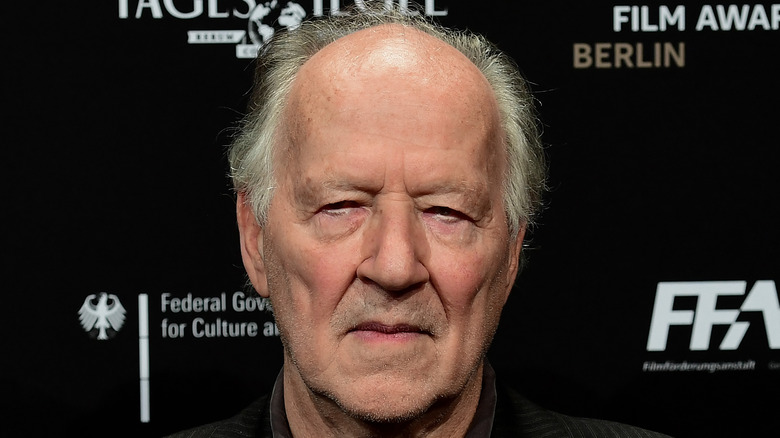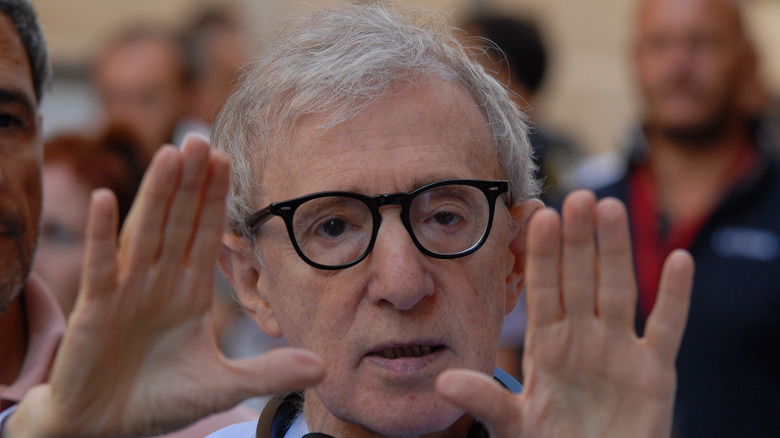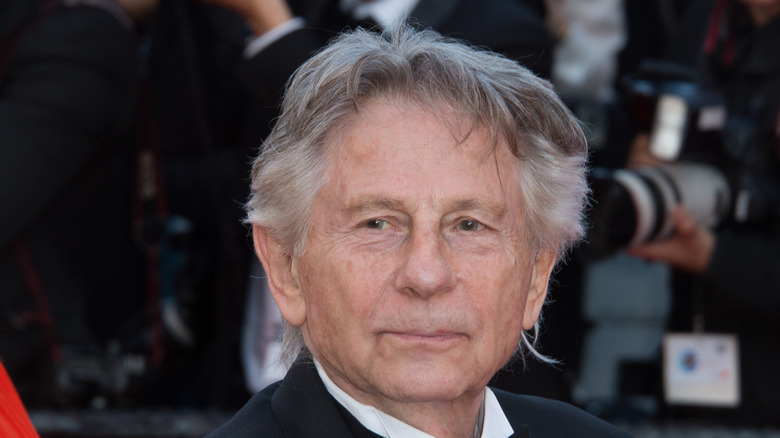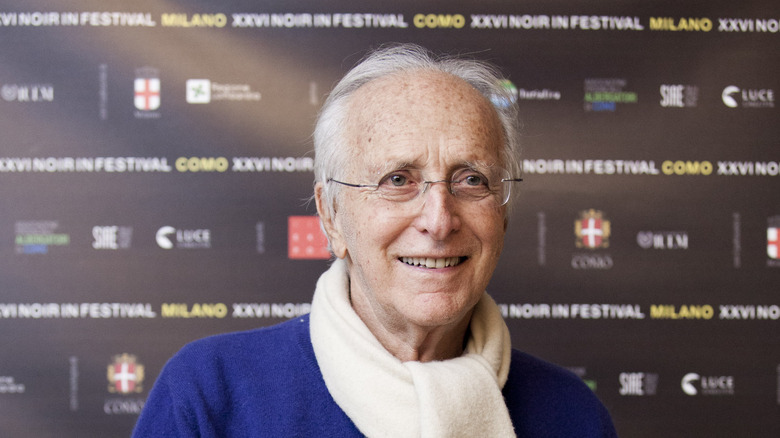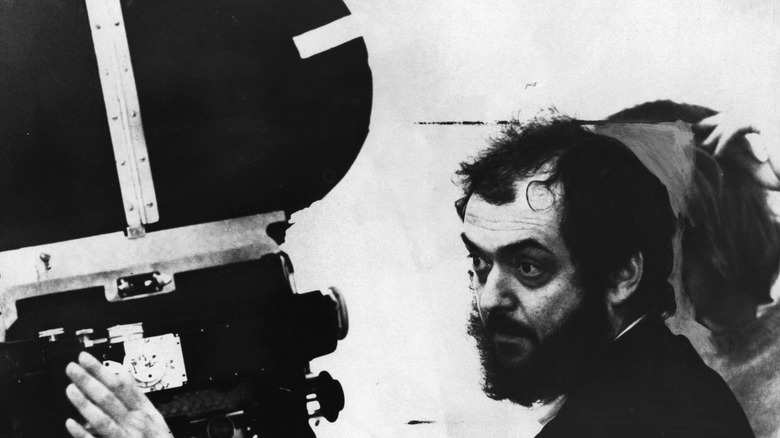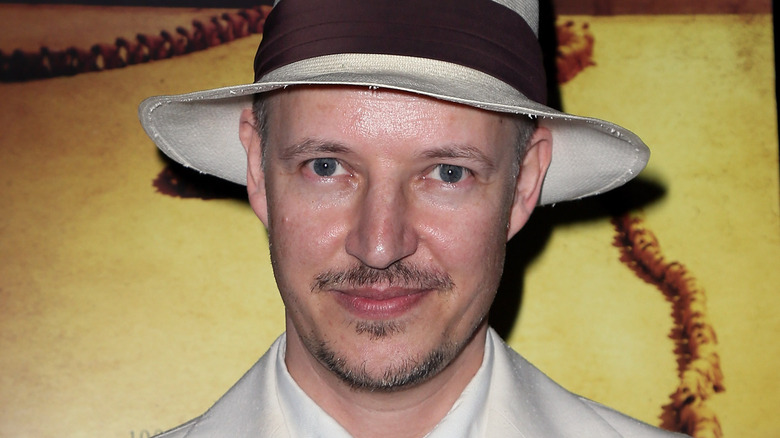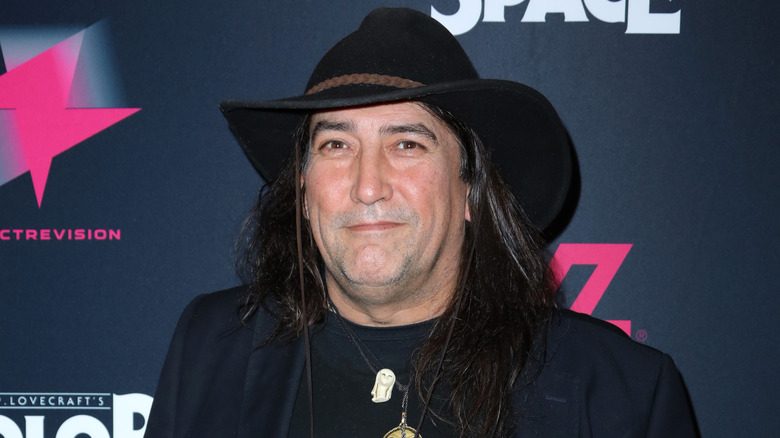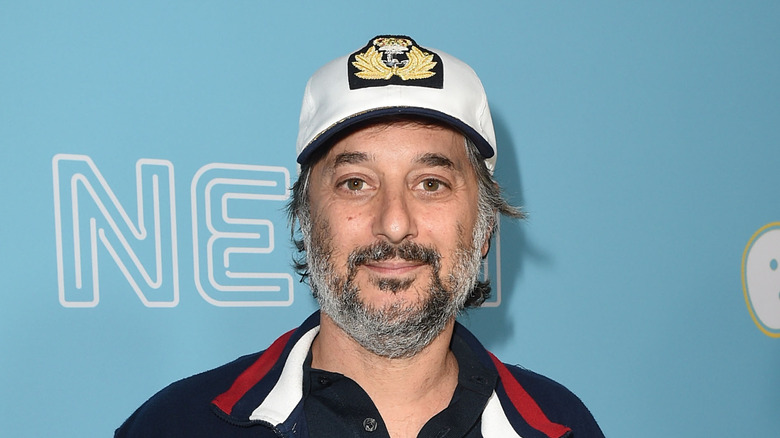The Most Controversial Directors Of All Time
We put a lot of stock emotionally and intellectually in famous film directors, placing many such prominent figures on pedestals. For a person in just about any artistic field, the lives and backstories of celebrated creatives serve as frequent inspiration. However, with genius can come ego — and with unchecked creativity can come unforeseen consequences.
There have been many directors, both old and new, whose cinematic offerings came hand in hand with controversy. Film directors have been embroiled in matters of behind-the-scenes etiquette, shocking creative decisions, and murky legalities. Some filmmakers have pushed good taste to its limits, while others have been embroiled in heavily publicized legal matters. From the likes of Lars von Trier to Harmony Korine, there's a lot of ground to cover when it comes to controversial directors.
These men we're about to recount each have a story or two associated with them, some more unpleasant than others.
Lars von Trier
Lars von Trier has earned quite the reputation in the world of cinema through his creations and his behavior behind the scenes. On the creative end of things, one need only look toward his aptly named "Depression Trilogy" for proof of his shocking choices. "Antichrist," "Melancholia," and "Nymphomaniac" all feature incredibly disturbing imagery and troubling metaphors involving depression. Von Trier's films, though shocking and often unpleasant, have always been praised for their deeper themes and imagery. "The House That Jack Built," despite having tons of walkouts at the Cannes Film Festival, still received an impressive standing ovation! This perfectly encapsulates the often polarized reaction to the uncompromising and visceral nature of von Trier's cinematic work.
However, en route to completing his most uncompromising works, von Trier has developed a reputation for mistreating his female stars. This reputation is through both the content present onscreen and stories from behind the scenes. In "Breaking the Waves," Emma Watson's character voluntarily degrades herself for her husband's enjoyment. This was a creative choice which only began the trend of unpleasant treatment toward von Trier's female characters. Additionally, it's noted that during the production of "Dogville," star Nicole Kidman and von Trier would get into intense arguments. Von Trier later made light of various abuse claims in a BBC interview where he stated his female stars, ultimately, must depend on him. He also said, "I don't think I've misused anybody, but I could, of course ... and I could be tempted to. But I don't think I have."
Takashi Miike
Based on its output, Japan has produced some of the most mind-bending visuals and gnarly movies of all time! From the body horror masterpiece "Tetsuo: The Iron Man" to the original basis for "The Ring" and "The Grudge," Japanese horror is loaded with gems. The genre has many notable creative figures, but the most noteworthy of all would definitely be Takashi Miike.
Sometimes the violence of a director's work is enough to garner a controversial legacy, which is certainly the case for Miike. All of his films, to varying degrees, showcase an absolute symphony of bloodshed and inappropriate behavior. One need only watch his most noteworthy creations, such as "Audition" and "Ichi the Killer," for proof of that. It would be fair to say both films, as well as Miike's other controversial material, have a shared gleeful sadism.
"Audition" especially serves as an example of Miike's talent for luring an audience in and hitting them with unrelenting sadism. The story of a seemingly perfect romantic partner harboring a shocking dark side has appeared on numerous horror movie rankings over the years. This is due in no small part to its climax, which showcases a long and sadistically drawn out torture scene.
Even the likes of Eli Roth and Rob Zombie both hail "Audition" as one of the most disturbing movies of all time. Both praised the film and Miike's direction as talking heads on Bravo's 100 Scariest Movie Moments back in 2004.
Woody Allen
When the conversation of Hollywood's most influential and successful directors comes up, Woody Allen is a favorite choice. Allen is best known for influential films such as "Annie Hall," "Manhattan," and "Bullets Over Broadway," just to name a few.
However, what will more than likely follow is a longer and, frankly, more unpleasant conversation about his life and actions. Woody Allen has had several wives during his time in the public eye, most notably actress Mia Farrow. Farrow had starred in 13 of Allen's films over the course of a ten-year period. During their affiliation with each other, two major events occurred, the first being Farrow adopting her daughter Dylan Farrow. Additionally, Allen would, controversially, begin a relationship with Farrow's other adopted child, Soon-Yi Previn. This already was an ethically questionable move, but what was to follow would only become more uncomfortable.
In 1992, Allen was accused of inappropriate actions in regards to Dylan Farrow, only eight months after his relationship with Previn was made public. These are allegations that Allen has denied and even sued Farrow over, attempting to gain custody of Dylan and Farrow's other children. To this day, the situation between Allen and Farrow has been the subject of much hearsay, rampant speculation, and in-depth coverage, the most notable being the HBO Documentary series "Allen v. Farrow," which is the most comprehensive piece of media regarding the allegations to date.
Roman Polanski
It's never a pleasant conversation when Roman Polanski comes up, but it is a necessary one that shouldn't be forgotten. Polanski helmed some of Hollywood's biggest and most influential films, such as "Chinatown" and "Rosemary's Baby." But throughout his career, his name was one frequently associated with controversy, even if not directly.
Polanski was married to Sharon Tate at the time of her untimely death at the hands of the Manson family in 1969. The next controversy Polanski would be involved in is one that he had a disturbingly direct hand in, however. In 1977, Polanski would be arrested for misconduct with a minor in a story that shook the media to its core. Despite denying the charges, Polanski accepted a plea bargain. Knowing jail time and deportation were imminent, he fled back to Europe and, to this day, has not returned to the United States.
The case remains one of the most controversial events in entertainment, a matter made even worse by the fact that Polanski hasn't faced justice and likely never will.
If you or someone you know may be the victim of child abuse, please contact the Childhelp National Child Abuse Hotline at 1-800-4-A-Child (1-800-422-4453) or contact their live chat services.
Ruggero Deodato
Sometimes, all it takes is one film to permanently cement your legacy within cinema forever, for better or worse. Ruggero Deodato has had quite the prolific career as not only a director but as a screenwriter and actor as well. It's evident through viewing his entire catalogue that Deodato very often pushed good taste about as far as he could, and good taste had little to no bearing on what is considered his seminal work, "Cannibal Holocaust."
"Cannibal Holocaust" focuses on the events before and after the disappearance of a documentary film crew gone missing in the Amazon. An NYU anthropologist treks into the Amazon to find the missing filmmakers or, rather, what is left of them. When people say that the film is one of the most disturbing of all time, they say so with very good reason. "Cannibal Holocaust" ticks every box it can, from animal cruelty to misogyny to intense levels of graphic violence. It's a film that portrays its harsh message in the most sickening, gritty, unrelenting, and realistic-looking way possible.
The movie landed Deodato in hot water, as many people were convinced its footage was real. This was helped in part by the actors signing a contract that they would make no public appearances for one year. This, plus a prominent French article about the film, left Deodato having to prove that he didn't kill his actors. Eventually, Deodato was able to get the actors to appear publicly to discredit the accusations, and he was cleared of all charges.
Stanley Kubrick
Is it possible for someone's genius to overshadow their more problematic attributes? In the case of Stanley Kubrick, it could very well be.
Among the various recurring traits, motifs, and thematic elements that permeate Kubrick's work, the most prominent would be a fixation on detail, from the crisp set design of "2001: A Space Odyssey" to the legitimately destroyed buildings in the background of "Full Metal Jacket." Kubrick also focuses on details that, truthfully, only mattered to him personally, the most famous example being in "Dr. Strangelove." Kubrick insisted that the war room table present throughout the film should be green like a poker table, since the characters were effectively gambling with people's lives. The thing is that "Dr. Strangelove" is black and white, so the table's green color isn't apparent.
Additionally, in terms of controversial decisions, one needn't look further than his decision to adapt "Lolita" in 1962. Adapting a story of that mature and disturbing nature would be a shocking move even today, let alone in the early 1960s.
Kubrick's most problematic behavior as a director would be his treatment of Shelley Duvall on the set of "The Shining." The character of Wendy Torrance is subject to severe psychological trauma, which Kubrick opted to capture by legitimately traumatizing Duvall. The most infamous story involves Kubrick's reported insistence that Duvall repeat the stairwell scene 127 times until he deemed it perfect. It was a needlessly cruel decision that created one of the film's most memorable scenes.
Tom Six
Tom Six, the creator of the notorious "Human Centipede" film trilogy, has certainly made a name for himself over the past few years. Few can claim that their cinematic contribution has been referenced by both "South Park" and "Key & Peele," but Tom definitely can! The films concern all manner of medical malpractice on groups of people, ranging in number from three to 500! Almost always sickeningly yet gleefully disturbing, the "Human Centipede" films forever changed the way moviegoers view the human gastrointestinal process. The trilogy, going as far back as its original announcement, has been the focus of much talk in the horror community.
Tom Six's films have been the subject of much buzz but also much heated criticism for their shocking content. Six with has received death threats for the content of "The Human Centipede." The second "Human Centipede" film was infamously denied the 18 rating by the BBFC in England. His film "The Onania Club" has been in release limbo for years due to its content, something Six has been vocal about. He's often been a major advocate for unfiltered freedom of expression in the world of cinema.
Richard Stanley
Sometimes, films are less interesting because of what they are but rather for what they could've been, and if there was ever a film that was plagued with disaster from the start, it would be "The Island of Dr. Moreau."
Director Richard Stanley had gained positive regard for his film "Hardware" in 1990, which opened the door for him to take on larger projects. Stanley had long been interested in adapting the novel "The Island of Dr. Moreau" since his early childhood. Despite his passion for it, the project spent four years in development before New Line Cinema finally gave him the green light. But what began as a passion project from a breakout director quickly devolved into one of cinema's most nightmarish productions.
Issues began immediately, with an ill-timed hurricane flooding many of the film's sets and holding up production. Additionally, from rampant studio meddling to Stanley clashing creatively with co-lead Val Kilmer, things weren't looking good. And then Stanley, only a week into production, was fired by New Line. Stanley left the set, but he didn't leave Australia, where the film was being shot. Due to some residual connections with the crew, Stanley was able to sneak back on set, after he'd spent about a month living in the jungle and smoking marijuana. He got back on set by dressing as one of the film's monsters, a dog man. Richard Stanley managed to perform as an extra, undetected, in the very film he was fired from.
Werner Herzog
Werner Herzog is one of those truly fascinating figures that you thought could only exist in eccentric old novels. With a decorated career consisting of feature films, documentaries, and various short films, Herzog has left behind quite the legacy. With such gripping documentaries as "Grizzly Man" and features like "Aguirre, the Wrath of God," Herzog has always pushed the envelope. His legacy is also one built upon pushing the envelope both artistically, behaviorally, and, in many cases, legally.
Herzog has had enough eccentric moments behind the scenes on his films to populate a dozen or so lists and articles, one of the more vibrant being a self-imposed ultimatum amid the production of "Even Dwarfs Start Small." Due to the staggeringly dangerous conditions the cast was subjected to during the production, Herzog offered his crew an incentive: If they finished production without any (more) injuries, he would willingly disrobe and jump into a cactus patch. The movie was completed, and as promised, Herzog took the unclothed leap, much to everyone's surprise.
Crazier than that would be illegally shooting a scene for his film "My Son, My Son, What Have Ye Done." This story was made public on the commentary track for the film's home media release. Herzog and crew traveled to China using student-issued Visas to film a scene without the Chinese government's knowledge.
Werner Herzog has made a career of going to the edge, parking himself there, and making art in defiance of common sense.
Harmony Korine
Being yourself can be a double-edged sword, and Harmony Korine is living proof of it.
Korine has always channeled a sense of dysfunction and dark absurdist humor into his films, especially in regards to childhood. Through films like "Kids" and "Ken Park," Korine will often look at childhood and adolescence through a grimy lens. His style, while undeniably unique, has resulted in a fair amount of critics and detractors. In a 1997 Toronto International Film Festival interview, Korine said critics had described him as juvenile and exploitative.
But for Korine, his big claim to controversy would be getting banned from "Late Night with David Letterman" for life. The first three times Korine graced "Late Night" with his presence were crash courses in cringe. His mumbling and detached demeanor was at constant odds with Letterman's direct and inquisitive nature. These interviews were additionally notable for Korine's mental and physical appearance deteriorating as time went on, possibly owing to the director's addictions to heroin and crack. The awkwardness would reach its apex when Letterman found Korine rifling through Meryl Streep's purse backstage at his fourth appearance on the show. This resulted in his lifetime ban and wouldn't be revealed until James Franco was doing press for "Spring Breakers" in 2013.
If you or anyone you know is struggling with addiction issues, help is available. Visit the Substance Abuse and Mental Health Services Administration website or contact SAMHSA's National Helpline at 1-800-662-HELP (4357).
